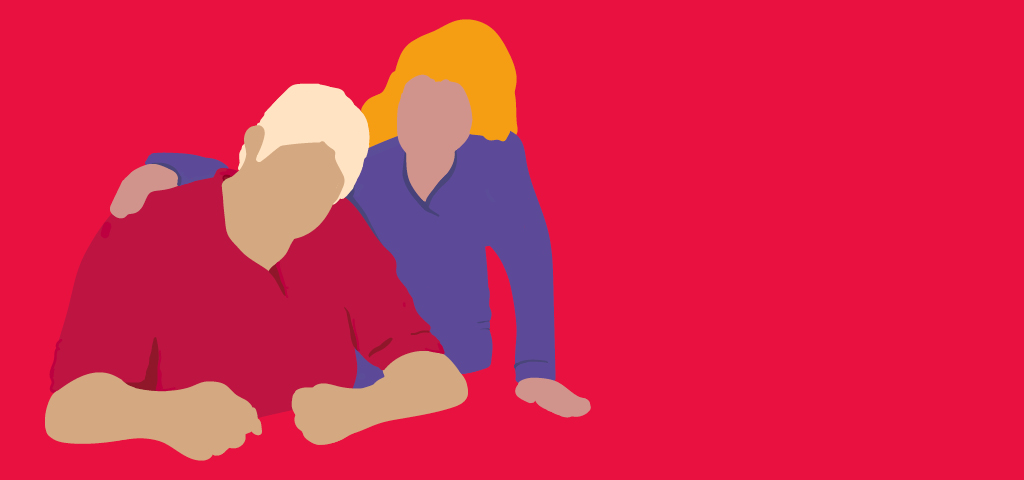The coronavirus (COVID-19) pandemic has brought huge change and uncertainty to all of us – in ways that were unimaginable a year ago. Where once we may have valued being able to make decisions and plans for the future that helped us to feel we had some control over aspects of our lives, the resulting uncertainty around the current and fast-changing situation has proved a challenging time for our community.
Finding ourselves in any situation we can’t control can be difficult to cope with – taking away our feeling of security and making us anxious about what might happen. This is especially true for our community, who have had to cope with the impact of their own or a loved one’s brain tumour diagnosis and treatment – bringing sudden and, at times, unexpected changes to their everyday lives.
And along with the diagnosis, waiting for scan results, changes to treatment due to the coronavirus pandemic and not knowing what the future will bring, may mean that the feelings of uncertainty they experience lead to a range of emotions in response, including anxiety, fear and anger.
Understanding our reaction to change and uncertainty
Our brains dislike change and uncertainty and can see them as a threat that switches on our fight or flight responses. This is because early humans needed to be able to react quickly to the threat of predatory animals, meaning that any perceived change to their surroundings could be a warning sign of imminent danger.
Today, no matter how evolved we think we are, our brains still operate in this primeval way when faced with a sudden change and a future that we’re unsure about. Because the human brain dislikes uncertainty so much, it tries to create certainty where it doesn’t exist by attempting to make sense of what might happen. Our brain’s preference for certainty over ambiguity means that it creates a series of worst-case scenarios around what could happen to us, but this does little to reassure us and can leave us anxious and worried.
“I try to focus on what I can control and to let go of the things I can’t. It’s a little bit of ‘fake it until you make it’ behaviour, but I honestly don’t stress about a lot of unnecessary things anymore.”
Tips from our community
Why do some of us struggle, but others don’t?
We can choose to make changes – like moving house, starting a new job or getting married, for example. These are changes we’ve planned and made decisions about, meaning that we feel we have some control.
But when change happens quickly and unexpectedly, we can find ourselves in a period of transition where we’re still holding on to the past because our brains take longer to adjust to the sudden change we’re experiencing.
The pace of transition varies hugely from one person to another. Some people adjust quickly, while others find it takes them a lot longer and is harder to deal with. As our brains try to play catch-up, the emotional impact can include a range of feelings as we try to cope.
Based on the work of the psychiatrist Elisabeth Kübler-Ross, which looked at people’s transition through grief, the change curve has also been used to help us understand our emotional reactions to change and uncertainty.
As with grief, what the change curve shows is that we move through a number of different stages:
- anxiety – “Can I cope with this sudden change?”
- denial – “If I ignore it, this change and uncertainty will go away.”
- emotion – “I recognise that things are different, but I don’t know what’s going to happen in the future and I’m sometimes feeling angry and/or frustrated about this change to how things were before.”
- fear – “I’m worried about how this is going to affect me and my loved ones. I feel low and lacking in energy.”
- acceptance – “I have come to terms with the new situation.”
- realisation – “I can see what I need to do.”
- energy – “I’m motivated and doing what I need to do.”
- growth – “This is working and I need to continue with this approach.”
Try to remind yourself that the scary, anxious thoughts you’re having aren’t facts. It’s just your brain going to the worst-case scenario. Try to focus on what you know for certain.
Tips from our community
Roller-coaster of emotions
The way we react may not follow each of these stages in order. For example, some people may not feel anxious or fearful and just accept the new situation they find themselves in. On the other hand, some people might get stuck in one of the stages. It’s quite common for people to find themselves stuck in denial at the start of a change and carry on regardless, pretending it isn’t happening.
Often there’s a roller-coaster effect as people move through the stages of change. For example, someone’s reaction might see them start off in denial, before feelings of fear begin to creep in. But just as they start to feel better and start moving towards acceptance, something happens and they feel fearful again.
This roller-coaster of emotions can happen within the same day and you may sometimes feel that you’ve taken a step backwards in your efforts to try to cope with the worry and anxiety you may be feeling. Try not to feel too discouraged that you’re not making the progress you’d like. We all move at a different pace through transition. Experiencing a setback is common and there are things you can do to help you cope.
I try very hard to acknowledge what’s going on around me and recognise how I’m feeling and put a name to it. I then let myself feel that emotion, but try not to invest energy into it. Instead, I put my energy into things that I can influence.
Tips from our community
Expert tips to help you cope with change
Dr Selina Makin, Clinical Neuropsychologist at Salford Royal Hospital, has put together some top tips to help you cope with change and uncertainty.
Uncertainty and change can feel very uncomfortable as they can both lead to anxiety, causing lots of physical sensations and thoughts that aren’t very pleasant. Here are some ideas on how to adjust things when uncertainty and change are more present in your life.
Selina Makin
1. Recognise uncertainty
Notice if you find yourself thinking, ‘What if…’ or ‘What might happen if…’ These are the types of thoughts we have about a possible future event, or when we can’t answer a problem as it has no current solution. Recognising that these thoughts are popping up is the first step in putting things in place to feel less anxious, or to feel like we can make space for these feelings as we can see them for what they are.
2. Control what you can
When so many things feel uncertain or we’re in a process of change, think about which aspects of your life you can control. These can then feel like your anchor. Think about who you can call on the phone, what you’re eating, and make time to do less – which leads to tip three…
3. Make time for downtime
We can overdo the sense of needing to be on the go and being busy when things are uncertain or changing, as it can seem like a good way to solve something that’s unsolvable at the present time. It’s also exhausting. So make the time to try mindful breathing, pop outside and observe what your senses notice, pick up a book or settle into a bath. This can give you some space when life feels full.
4. Delegate
Uncertainty, worry and anxiety can feel like an overflowing saucepan on the hob and sometimes we need to turn down the heat or empty out some of the contents. Is there anything you can ask someone else to do, or is there something you can do a bit less of to help create some breathing space in your daily life?

Get support
If you need someone to talk to or advice on where to get help, our Support and Information team is available by phone, email or live-chat.
Coronavirus and brain tumours
Find out more about how the coronavirus pandemic is affecting treatment and advice on how to cope.
Online support groups
Join our community online to connect with others who understand, in our safe and welcoming spaces
Advice from our community
Read tips and advice from our community about how to cope with change after diagnosis and treatment.
